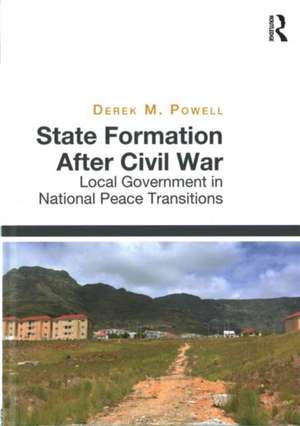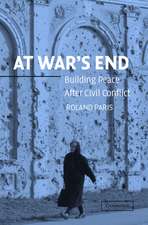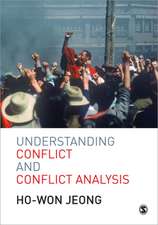State Formation After Civil War: Local Government in National Peace Transitions
Autor Derek M Powellen Limba Engleză Hardback – 11 aug 2016
Where the national-centric models see local government as a matter belonging to policy on decentralization for later in the reconstruction phase, the book uncovers a distinct "local government dimension" to peace transitions: A civic dimension to national conflicts that must be explained; incipient or proto-local authorities that emerge even during civil war, in peace making, after state collapse; the fact that it is common for peace agreements and constitutions to include rules for local authority, for local elections to be held as part of broader democratization, and for laws to be enacted to establish local government as part of peace compacts. The book develops the concept of local peace transition to explain the distinctive constitutive role of this local dimension in peace-making and state formation.
This path-breaking book will be of compelling interest to practitioners, scholars and students of comparative constitutional studies, international law, peace building and state building.
| Toate formatele și edițiile | Preț | Express |
|---|---|---|
| Paperback (1) | 178.76 lei 6-8 săpt. | |
| Taylor & Francis – 30 iun 2020 | 178.76 lei 6-8 săpt. | |
| Hardback (1) | 528.44 lei 6-8 săpt. | |
| Taylor & Francis – 11 aug 2016 | 528.44 lei 6-8 săpt. |
Preț: 528.44 lei
Preț vechi: 705.45 lei
-25% Nou
Puncte Express: 793
Preț estimativ în valută:
101.12€ • 104.48$ • 84.12£
101.12€ • 104.48$ • 84.12£
Carte tipărită la comandă
Livrare economică 20 martie-03 aprilie
Preluare comenzi: 021 569.72.76
Specificații
ISBN-13: 9781472462183
ISBN-10: 1472462181
Pagini: 280
Dimensiuni: 174 x 246 x 20 mm
Greutate: 0.66 kg
Ediția:1
Editura: Taylor & Francis
Colecția Routledge
Locul publicării:Oxford, United Kingdom
ISBN-10: 1472462181
Pagini: 280
Dimensiuni: 174 x 246 x 20 mm
Greutate: 0.66 kg
Ediția:1
Editura: Taylor & Francis
Colecția Routledge
Locul publicării:Oxford, United Kingdom
Cuprins
Chapter 1 Introduction
Chapter 2 Peacebuilding
The Rise of the Post-Cold War Peace and Security Architecture
Integrated Transition
The ‘Peace Map’ of a Typical UN Peace Building Operation
Fragmentation Not Integration
Chapter 3 State Building
The Evolution of Post-Conflict State Building
Building Denmark
Building Leviathan
The Core State Functions Model
The Grand Bargain model
State Building Limits Our View of State Formation
Chapter 4 State Formation in National Peace Transitions
State Formation as Historical Process Imperfectly Shaped by Human Design
The State as an Incipient System of Rules for State Authority
National Peace Transition as a Normative Field of State Formation
Chapter 5 Cities and State Formation
Federalism and Local Government
Decentralization and Local Government
The Constitutive Role of Local Government in State Formation
Incipient Local Authority
The Formation of Rules for Local Authority in National Peace Transitions
Local Peace Transition
Chapter 6 The South African Peace Transition
State Racism and the Long Arc of Conflict in South Africa (1910-1993)
The Fragile Apartheid State
The Peace Transition: Political Negotiations and Constitution-Making (1990-1996)
Chapter 7 Civic Conflict
Local Government and the Enforcement of Apartheid
Civic Struggle as People’s War
The Civic Dimension of the Conflict
Civic Conflict Defined the Pathways for the Local Peace Transition
Chapter 8 The Local Peace Transition in South Africa
Local Peace Agreements
The ‘Local Government’ Constitution
Elected Transitional Local Council
Local Peace Transition
Chapter 9 Cities and State Formation in National Peace Transitions
Bibliography
Index
Chapter 2 Peacebuilding
The Rise of the Post-Cold War Peace and Security Architecture
Integrated Transition
The ‘Peace Map’ of a Typical UN Peace Building Operation
Fragmentation Not Integration
Chapter 3 State Building
The Evolution of Post-Conflict State Building
Building Denmark
Building Leviathan
The Core State Functions Model
The Grand Bargain model
State Building Limits Our View of State Formation
Chapter 4 State Formation in National Peace Transitions
State Formation as Historical Process Imperfectly Shaped by Human Design
The State as an Incipient System of Rules for State Authority
National Peace Transition as a Normative Field of State Formation
Chapter 5 Cities and State Formation
Federalism and Local Government
Decentralization and Local Government
The Constitutive Role of Local Government in State Formation
Incipient Local Authority
The Formation of Rules for Local Authority in National Peace Transitions
Local Peace Transition
Chapter 6 The South African Peace Transition
State Racism and the Long Arc of Conflict in South Africa (1910-1993)
The Fragile Apartheid State
The Peace Transition: Political Negotiations and Constitution-Making (1990-1996)
Chapter 7 Civic Conflict
Local Government and the Enforcement of Apartheid
Civic Struggle as People’s War
The Civic Dimension of the Conflict
Civic Conflict Defined the Pathways for the Local Peace Transition
Chapter 8 The Local Peace Transition in South Africa
Local Peace Agreements
The ‘Local Government’ Constitution
Elected Transitional Local Council
Local Peace Transition
Chapter 9 Cities and State Formation in National Peace Transitions
Bibliography
Index
Notă biografică
Derek Powell is an Associate Professor in Law and Head of the Multi-Level Government Initiative in the Dullah Omar Institute of Constitutional Law, Governance and Human Rights at the University of the Western Cape. He served as a deputy director-general, senior civil servant and policy advisor in the South African government under the Mandela and Mbeki administrations (1996-2009), where he worked on key policy processes to establish and reform the systems of democratic local government and intergovernmental relations. He was head of the research department at the Constitutional Assembly during the process to draft a democratic constitution for South Africa (1994-96). His research interests focus on comparative constitutional studies, international peace and security law and politics, local government, intergovernmental relations, public finance management, and more recently on using large datasets in researching complex problems of governance that cut across the law, state, economy, and society. He is co-editor of Jaap de Visser, Nico Steytler, Derek Powell, Ebenezer Durojaye eds., Constitution Building in Africa (Nomos, 2015).
Recenzii
‘This is a helpful and important study. Powell deftly criticises overly prescriptive and deterministic models for post-conflict peace building, highlighting the need to take real people, real needs and real struggles into account, not as problems but as enabling factors for rebuilding a sustainable polity.’
David Chandler, University of Westminster, UK
Since it has become clear that the international instruments relating to fragile states are failing, it is time to seek new avenues. Professor Powell offers us a new, comprehensive approach that will be much welcomed by both academics and practitioners.
Henk Kummeling
Distinguished University Professor, professor of Constitutional Law , Utrecht University
Chair Electoral Council, The Netherlands
David Chandler, University of Westminster, UK
Since it has become clear that the international instruments relating to fragile states are failing, it is time to seek new avenues. Professor Powell offers us a new, comprehensive approach that will be much welcomed by both academics and practitioners.
Henk Kummeling
Distinguished University Professor, professor of Constitutional Law , Utrecht University
Chair Electoral Council, The Netherlands
Descriere
This book examines the transition from civil war to peace. It explores how it can be understood as a `national’ experience and not simply as the sum of what international peace builders do. Mining ideas drawn from the literatures on peacebuilding, state building, state formation, decentralization, development, and federalism, as well as evidence from 19 major peace processes, including a detailed study of the South Africa transition in the 1990s, the book proposes a new heuristic. It will be of important for officials and practitioners working in post-conflict situations, as well as academics and students of comparative constitutional law, peace building and state building.









